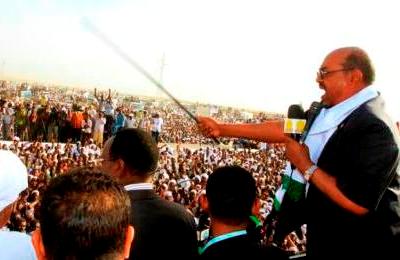Abyei is a Sudanese territory, reaffirms President Bashir
February 13, 2017 (KHARTOUM) – President Omer al-Bashir Monday has asserted that Abyei remains a Sudanese territory pointing that the national authorities perform their full administrative duties

“Sudanese President reaffirmed that Abyei is a Sudanese territory and every Sudanese can apply for all the identification documents from Abyei,” reported the news agency SUNA.
The official news agency didn’t explain why al- Bashir made this statement. But seemingly the women group raised the administrative difficulties Sudanese are facing in the disputed area which is without official institutions.
In March 2015, speaking from Al-Fula the capital of West Kordofan state, Sudanese President Omer Hassan al-Bashir declared that the contested Abyei area belongs to Sudan and will remain a Sudanese territory.
Sudanese official used to underline that the Abyei protocol of the Comprehensive Peace Agreement (CPA) provides that Abyei remains part of Sudan until a referendum has taken place.
In accordance with the 2005 peace agreement, the residents of the disputed area of Abyei have to decide in a referendum if they want to remain part of the Sudan or join South Sudan. But the failure to reach an agreement over who is a resident of Abyei prevents to conduct the vote.
Also, the Ngok Dinka refuse the implementation of an agreement reached on 20 June 2011 to establish an interim administration in Abyei.
They demand that Khartoum accepts to hold a referendum without the participation of the Misseriya pastoralists who move between the disputed area and other parts of Sudan every year.
Khartoum and Juba rejected an unilateral referendum organized by the Ngok Dinka where they decided to join the South Sudan.
But the two capitals formed two separate administrations to for the inhabitants of the disputed areas. Also Khartoum formed the Higher Abyei Dinka Affairs Coordinating Council to manage issues related to the Ngok’s integration in the Sudan and solve local disputes with the Misseriya.
(ST)
